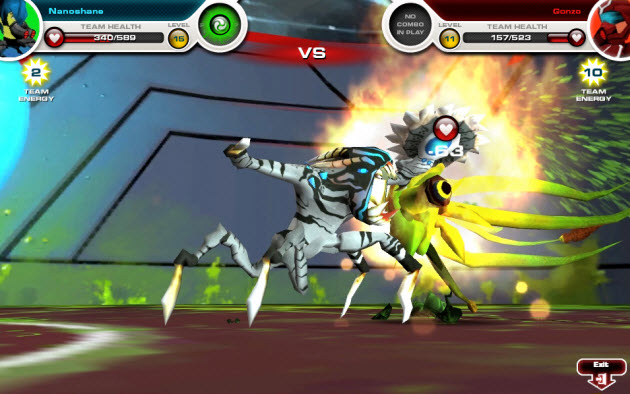
When the high-profile tech toy startup Smith & Tinker launched its Nanovor hybrid toy and online game last fall, it was a big bet with lots of money spent on TV ads aimed at young boys. With Nanovor, kids could battle each other on the web in Pokemon-style character combat or play in person using a $50 toy. But kids didn’t buy it.
[aditude-amp id="flyingcarpet" targeting='{"env":"staging","page_type":"article","post_id":212719,"post_type":"story","post_chan":"none","tags":null,"ai":false,"category":"none","all_categories":"business,games,","session":"C"}']That forced the Bellevue, Wash.-based company to lay off a bunch of its workers and pivot into a web-only game that can be played via computer or mobile phones. That agile maneuver has won the company a second chance.
AI Weekly
The must-read newsletter for AI and Big Data industry written by Khari Johnson, Kyle Wiggers, and Seth Colaner.
Included with VentureBeat Insider and VentureBeat VIP memberships.
Joe Lawandus, co-founder of Smith & Tinker, said in an interview that the number of battles users fight has increased five-fold over the previous version of the game. The game is free to play, meaning kids can play it for free but have to pay if they want to buy virtual items in the game.
With the original game, the audience actually skewed higher than the 8 – 12-year-old demographic it was targeting. That meant the TV ads were kind of a waste. Also, it turned out that kids didn’t want to download the 300-megabyte client over the web, Weisman said.
Problems with downloading is why many light Flash games with no downloads do better on the web. But 300 megabytes isn’t huge. The bigger problem was that parents have pretty much prohibited their kids from downloading anything to their computers for fear they’ll end up with a virus.
With the new game, Smith & Tinker is trying to tackle
The hybrid toy-web concept was a good one for the original Nanovor, which won various awards for its creativity. Nanovor toys sold moderately well, but the company has now discontinued production and will let them sell out.
[aditude-amp id="medium1" targeting='{"env":"staging","page_type":"article","post_id":212719,"post_type":"story","post_chan":"none","tags":null,"ai":false,"category":"none","all_categories":"business,games,","session":"C"}']
“The industry is moving away from expensive retail products and is headed toward digital distribution,” Weisman said.
By getting rid of the toy, Smith & Tinker loses retail exposure for its products but lowers its costs dramatically. The company laid off a bunch of its retail-focused employees in December and now has 25 workers.
Fortunately, Smith & Tinker raised $29 million, a large amount for a game company, largely on Weisman’s reputation. Weisman has worked on a wide variety of successful entertainment companies, including FASA, WizKids, Virtual World Entertainment, and 42 Entertainment. He founded Smith & Tinker with Lawandus in 2007. Since the company had raised a lot of money, it had enough cash to pivot to its alternative strategy.
[aditude-amp id="medium2" targeting='{"env":"staging","page_type":"article","post_id":212719,"post_type":"story","post_chan":"none","tags":null,"ai":false,"category":"none","all_categories":"business,games,","session":"C"}']
And, in addition to Nanovor Evolution, Smith & Tinker is now working on a new digital collectible Facebook game for Marvel Entertainment, the comic book and movie company, related to its superhero characters. That game will be released next year. With luck, this change in strategy may cement the company’s comeback.
VentureBeat's mission is to be a digital town square for technical decision-makers to gain knowledge about transformative enterprise technology and transact. Learn More
